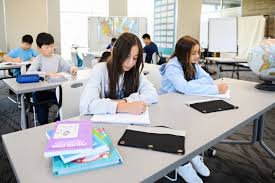How We Help Students With Math Competitions
We can help students prepare for math competitions by teaching them math skills they may have forgotten, math skills they have not yet learned, and by working with them to develop their problem-solving abilities.
What Are Math Competitions?
In Canada, the most well-known math contests were designed by the University of Waterloo and have different names depending on the grade level: Pascal (grade 9), Cayley (grade 10), Fermat (grade 11), and Euclid (grade 12).
Did you know? While these contests are well-known in Canada and designed by the University of Waterloo in Waterloo, Ontario, Canada, students worldwide participate!
While students in the United States can and do participate in these math contests, they also have their national math competitions (American Mathematics Competitions - AMC) called the AMC 8 (for students in grade 8 and below), the AMC 10 (for students in grade 10 and below), and the AMC 12 (for students in grade 12 and below). The Mathematical Association of America runs these competitions, and students from over 30 countries, including Canada, participate.
It is interesting to note that students CAN use calculators when they complete the University of Waterloo math contests, but students CANNOT use calculators when they participate in the American Mathematics Competitions.
The University of Waterloo math contests and the AMC are just examples of math competitions, many others exist in the world.
What Is the Purpose of Math Competitions?
Students get an opportunity to solve innovative problems by applying what they learned in the math classroom. They are also fun!
The Centre for Education in Mathematics and Computing at the University of Waterloo states that the contests are a fun way for students to grow their problem-solving skills, build confidence, and get creative with math. The Mathematical Association of America states that the purpose of the AMC is to bolster students’ confidence and passion for math.
Beyond fun and skill development, participating in these contests can also enhance an applicant’s university application and potentially qualify them for entrance scholarships. They are also great bragging rights! (I, Nicole Hancock, came in third place in Saskatchewan in a math competition in grade 6, and I still brag about it!)
How Can Clever Minds Online Learning Centre Help Students Prepare For Math Competitions?
We have experience helping students prepare for a variety of math competitions (AMC 8, University of Waterloo, others). The procedure we use to help students prepare for math competitions is as follows:
We discuss the basic requirements of the competition (whether they can use a calculator, the number of questions, the time limit, etc.). We provide the student with some example questions from previous competitions of that type (previous University of Waterloo math contests can be found here, and previous AMC math competitions can be found here) to determine their current problem-solving skills and their level of math ability in general.
We discuss problem-solving methods for the example questions they completed with the student and explicitly teach any math processes that they may have forgotten or have not yet learned that can help them to solve those math problems. We provide the student with homework related to these math processes and have them memorize basic facts about mathematics that will be helpful for them to have memorized when they participate in the competition (kind of like how Jeopardy contestants memorize United States presidents, world capitals, Shakespeare characters, etc.). All of the math processes and memorized math information that the student works on are checked periodically to ensure that they continue to remember these important pieces of knowledge for the competition.
We use the example questions that the student completed to discuss problem-solving strategies with the student. For example, some strategies that they may have used are to solve a simpler problem, guess and check, and look for a pattern. Many students do not think that guess and check is an actual strategy for solving math problems, but we assure them that it is!
We provide the student with some more example questions to work on and discuss how they will go about the problem, which problem-solving strategy they will use, etc., with them.
Anything that was encountered in terms of math skills that the student has not yet learned, or math information that it would be helpful for the student to memorize, while completing the second batch of example questions, is taught explicitly, and the student receives homework to practice the skills and memorize the math information.
We begin providing the student with full-length math practice competitions. The students’ time on each question is tracked, and the answers are checked. The student is asked how they felt about completing the full-length math practice competition, how they felt about their use of time, what they feel they need help with or need to practice, etc. Feedback is given to the student about their time spent on each question and their results.
Anything that was encountered in terms of math skills that the student has not yet learned, or math information that it would be helpful for the student to memorize, while completing the full-length math practice competition, is taught explicitly, and the student receives homework to practice the skills and memorize the math information.
We repeat steps 6 and 7 until the student can complete the competition with a good mark within the time limits of the competition and feels confident about their ability to obtain a successful result in the actual competition.




